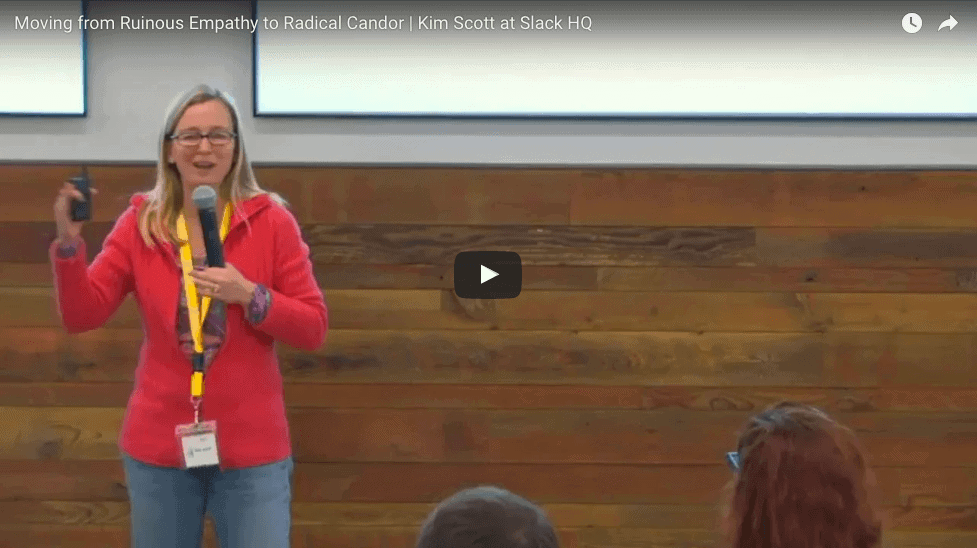Ruinous Empathy is a Waste of Your Time
Hi there - I'm Russ, and this is my first blog post for Candor, Incorporated. My Little League baseball players call me Coach Russ, and I'm going to...
3 min read
Radical Candor Sep 27, 2022 12:34:39 AM

Do you think your feedback is often Ruinously Empathetic? If so, you're not alone. In our experience, most feedback mistakes fall in the Ruinous Empathy quadrant.
Ruinous Empathy is what happens when you want to spare someone’s short-term feelings, so you don’t tell them something they need to know. You Care Personally, but fail to Challenge Directly.
It’s praise that isn’t specific enough to help the person understand what was good or criticism that is sugar-coated and unclear. Or simply silence. Ruinous Empathy may feel nice or safe, but is ultimately unhelpful and even damaging. This is a feedback fail.
People tend to back down from their Direct Challenge because they want to be "nice." If you can relate, don't despair, we've got advice for moving away from Ruinous Empathy and toward Radical Candor.
Need help with Radical Candor? Let's talk! >>
Listen to a story and a simple piece of advice in this video of Radical Candor author and co-founder Kim Scott answering an audience question at Slack HQ:
https://youtu.be/_XQBxPy3Ah4
Praise can be Ruinously Empathetic when bosses try to be “nice” and get things wrong. Click the link to read a few cautionary tales of how trying to make a person feel good without taking the time to understand the details of their work to challenge them appropriately can go astray. Learn more >>
When bosses care too much about hurting their employees’ feelings, they will avoid giving criticism. Eventually, it becomes too late to fix this Ruinously Empathetic situation. Learn more >>
One of the best ways to make your intentions clear when you want to offer guidance* to someone is to state your intention to be helpful before giving them feedback.
In Radical Candor, Kim Scott notes, “Perhaps the simplest advice I have to give here is for you to tell the person you are giving feedback to that you are trying to be helpful. Try a little preamble for hard criticism.”
She continues, “For example, try saying, in words that feel like you, ‘I’m going to tell you something because if I were in your shoes I’d want to know so I could fix it.’ Simply exposing your intent to be helpful offers clarity to the other person about your intentions. Most people will want to hear whatever it is you’re going to say.”
————————————————————————————————————————————————————————————–
Need help practicing Radical Candor? Then you need The Feedback Loop (think Groundhog Day meets The Office), a 5-episode workplace comedy series starring David Alan Grier that brings to life Radical Candor’s simple framework for navigating candid conversations.
You’ll get an hour of hilarious content about a team whose feedback fails are costing them business; improv-inspired exercises to teach everyone the skills they need to work better together, and after-episode action plans you can put into practice immediately to up your helpful feedback EQ.
We’re offering Radical Candor readers 10% off the self-paced e-course. Follow this link and enter the promo code FEEDBACK at checkout.

Order Kim’s new book, Just Work: How To Root Out Bias, Prejudice, and Bullying to Create a Kick-Ass Culture of Inclusion, to learn how we can recognize, attack, and eliminate workplace injustice ― and transform our careers and organizations in the process.
We ― all of us ― consistently exclude, underestimate, and underutilize huge numbers of people in the workforce even as we include, overestimate, and promote others, often beyond their level of competence. Not only is this immoral and unjust, but it’s also bad for business. Just Work is the solution.
Just Work is Kim’s new book, revealing a practical framework for both respecting everyone’s individuality and collaborating effectively. This is the essential guide leaders and their employees need to create more just workplaces and establish new norms of collaboration and respect.

Hi there - I'm Russ, and this is my first blog post for Candor, Incorporated. My Little League baseball players call me Coach Russ, and I'm going to...
What makes Radical Candor radical is that it’s a deviation from the norm, which tends to fall somewhere between acting like a jerk and avoiding...

According to Gallup's Leadership and Management Indicator, only 21% of employees in the U.S. trust the leadership in their organization. In addition,...